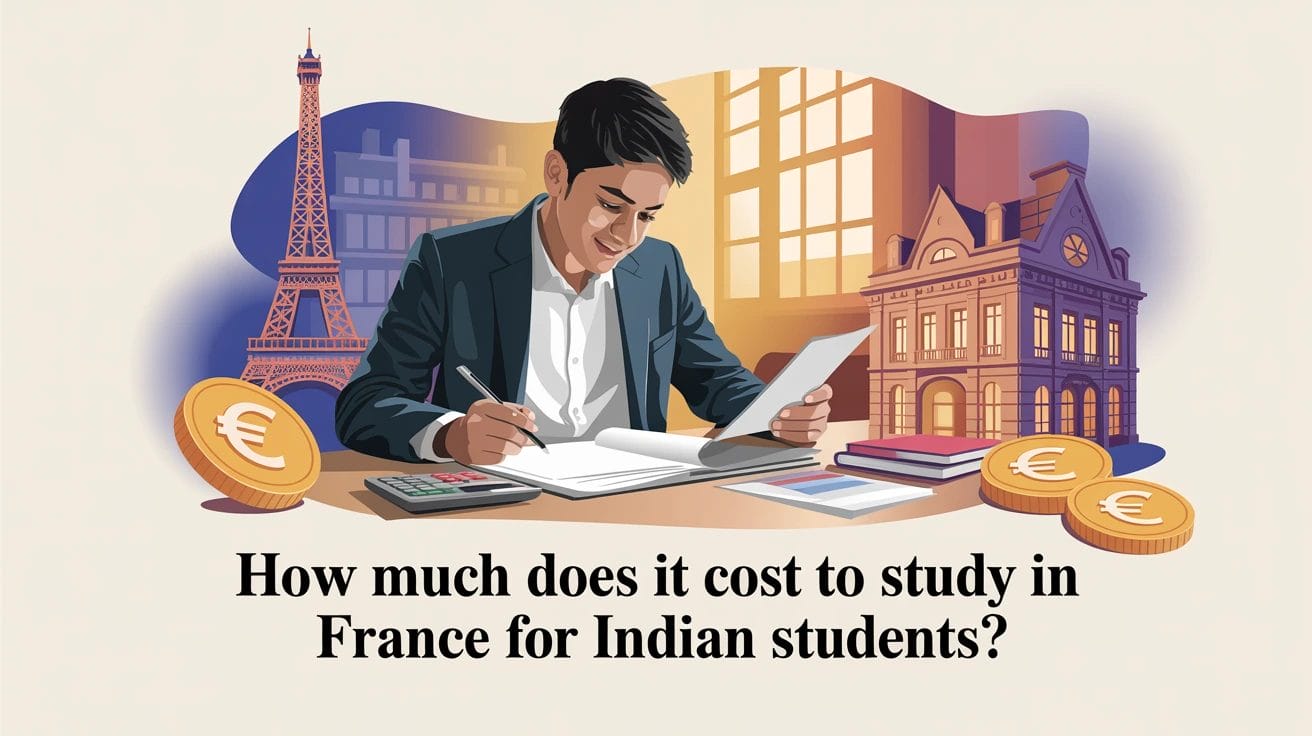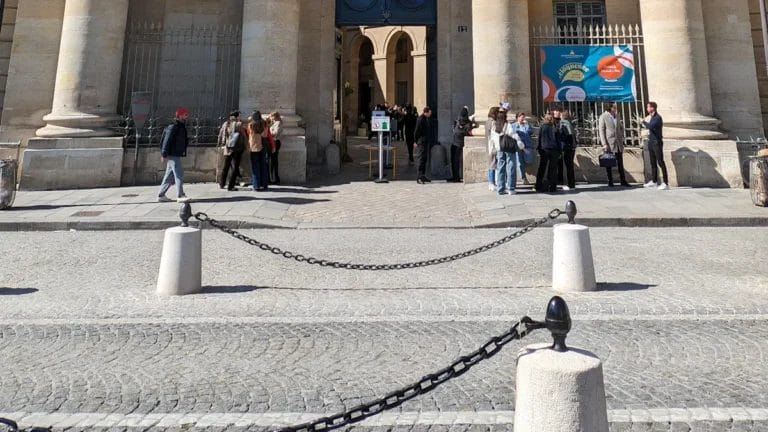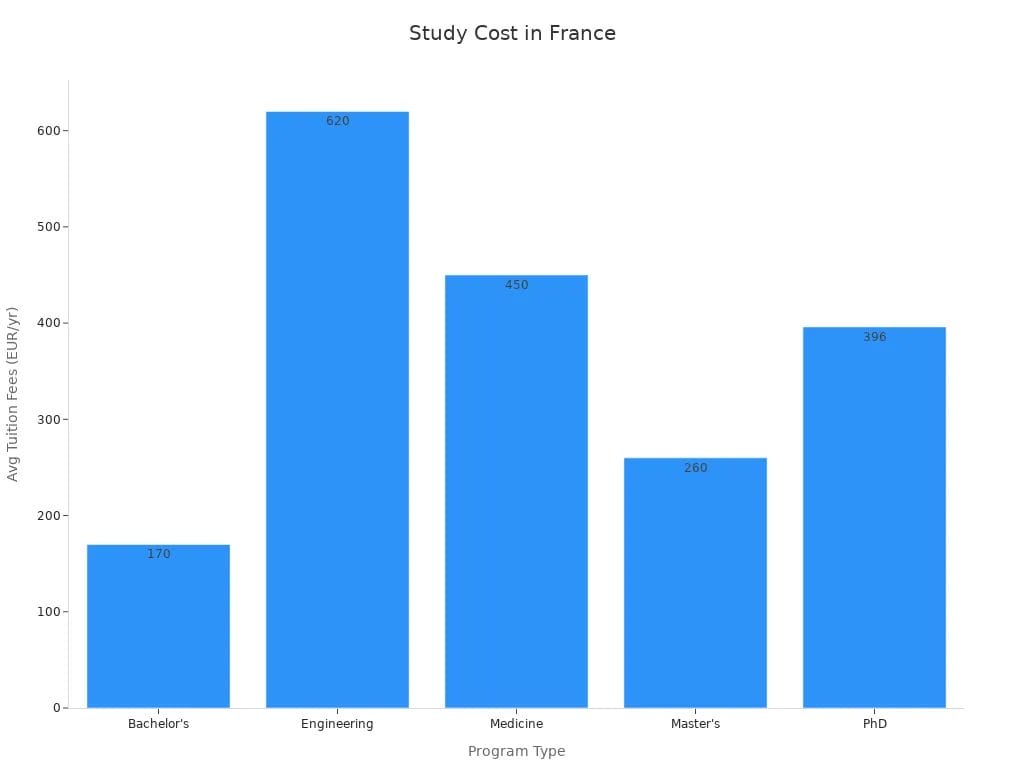
making it an attractive option for many students. The cost to study in France at public universities ranges from €10,000 to over €60,000, while private schools may incur even higher fees. Living costs vary by city; for instance, Paris can cost between €1,200 to €1,800 each month, whereas smaller cities like Lyon or Nantes start at around €800 monthly. Student accommodations outside of Paris typically cost about €200 per month, which can significantly help save money on housing. Additionally, scholarships and part-time job opportunities can further reduce expenses. These options enable students to manage their financial commitments more effectively while pursuing their studies in France.

Thinking about studying in France? One big question is tuition costs. The good news is, France has options for everyone. You can choose between cheaper public universities or pricier private schools. Let’s break it down to make it simple.
Public universities in France are budget-friendly, especially for international students. The government helps fund these schools, so fees stay low. For a bachelor’s degree, you’ll pay about €2,770 yearly. Master’s programs cost around €3,770 per year. Doctorate programs are even cheaper at just €380 annually.
Here’s a quick table of average tuition fees:
| Type of Course | Average Fees (EUR/year) |
|---|---|
| Bachelor’s (Licence) | 2,770 |
| Master’s | 3,770 |
| Doctorate | 380 |
Top public universities like Université PSL and Université de Paris offer great education at these low prices. If you want to save money, public universities are a smart choice.
Private universities in France cost more than public ones. They don’t get government funding, so fees are higher. You’ll pay between €4,000 and €20,000 yearly. Some schools, like business schools, may charge up to €30,000 a year.
Key points about private university fees:
Private universities are pricey but offer unique benefits. Think about the costs and advantages before choosing one.
Indian students can find affordable schools in France. Public universities are the cheapest, but some private schools also have good rates.
Here are some affordable options:
These schools combine low fees with great education. Whether you like engineering, business, or tech, there’s a program for you.

When studying in France, knowing living costs is important. Expenses depend on the city, your lifestyle, and choices. Let’s look at the main costs you’ll face.
Choosing student housing is a big decision. Rent prices vary by city and housing type. Paris is the priciest, with studio apartments costing €1,085 monthly. Sharing an apartment lowers costs to €962, including utilities. Smaller cities like Lyon or Bordeaux have cheaper rents, starting at €400-€600 monthly.
Here’s a list of typical monthly housing costs:
For affordable housing, try CROUS student residences. These government-supported options cost €200-€400 monthly and are popular with international students.
Food is a key part of your budget. Groceries cost about €400 monthly. Eating out at a mid-range restaurant costs €14 per meal. A CROUS cafeteria meal is just €3. Coffee costs €2.83, and a beer is €6.
Here’s a quick summary of food costs:
| Expense Type | Cost (EUR) |
|---|---|
| Groceries | 400 |
| Meal | 14 |
| Coffee | 2.83 |
| Beer | 6 |
To save money, cook at home or eat at CROUS cafeterias. These small changes can help reduce your food expenses.
Traveling in France is easy with public transport. Monthly travel costs depend on the city. In Paris, a travel card costs €84 monthly. In smaller cities like Bordeaux, it’s €40. Taxis in Paris start at €5, with €1.82 per kilometer added.
Here’s a comparison of transport costs in major cities:
| Expense | Paris | Lyon | Nice | Bordeaux |
|---|---|---|---|---|
| One-way ticket | €2 | €1.90 | €1.50 | €1.70 |
| Monthly pass | €84 | €66 | €42 | €40 |
| Taxi start (normal tariff) | €5 | €5 | €5.50 | €2 |
| Taxi 1 km (normal tariff) | €1.82 | €1.55 | €2.08 | €1.66 |
| Gas (1 liter) | €1.99 | €1.93 | €1.89 | €1.89 |
To save on travel, use student discounts or ride a bike. Public transport is reliable and affordable for students.
When studying in France, healthcare and insurance are important. France has a great healthcare system. Students can use it at low costs. Let’s explain the details.
Students under 28 need health insurance in France. It’s affordable, costing €200 to €400 yearly. This covers doctor visits, hospital stays, and prescriptions.
If you’re over 28, private insurance is required. Costs depend on the provider and plan. Expect to pay €20 to €50 monthly.
Tip: Check if your home country’s insurance works in France. Some plans include international coverage, helping you save money.
Doctor visits in France are cheap. A general doctor charges €25 per visit. Specialists cost €30 to €50. Insurance often reimburses these expenses.
Here’s a quick look at healthcare costs:
| Service | Cost (EUR) |
|---|---|
| General practitioner | 25 |
| Specialist visit | 30-50 |
| Prescription medicine | 5-20 |
Dental and eye care are also affordable. But basic insurance may not cover everything.
Use public hospitals and clinics to save money. They provide excellent care at lower prices. Register with a local doctor when you arrive. This makes future visits easier.
Planning for healthcare and insurance is important. With good preparation, you can manage these costs and focus on studying.
Before moving to France, you’ll need to plan some expenses. These include tests, visas, and travel costs.
Here’s a simple breakdown:
Here’s a quick summary of these costs:
| Expense Type | Details | Cost Range (INR) |
|---|---|---|
| Application Fees | IELTS, TOEFL, GMAT, GRE | ₹100 – ₹21,000 |
| Visa Costs | Short-stay and long-stay visas | ₹6,500 – ₹79,297 |
| Travel Costs | Flights and initial travel | ₹30,000 – ₹1,00,000 |
Planning ahead helps make your move easier and stress-free.
After arriving in France, you’ll have setup and living costs. These include rent, food, transport, and other basics. Here’s what you might spend:
| Expense Type | Average Cost (USD) |
|---|---|
| Rent | 9 |
| Groceries (Incl. Wine) | 600 |
| Car (Insurance/Maintenance) | 80 |
| Gas (Diesel/Petrol for car) | 128 |
| Gas (Heating/Stove) | 70 |
| Electricity | 62 |
| Phone (Landline) | 21 |
| Health Insurance Top Up | 35 |
| Internet | 32 |
| Cellphone Plan | 22 |
| Lunch Out (Five Times a Month) | 200 |
| Misc. (Coffee, Croissants, etc.) | 80 |
| Movie Tickets | 16 |
| Total Monthly Costs | $2,225 to $2,625 |

To save money, use student discounts for housing and transport. Cooking meals at home instead of eating out also helps. Budgeting well lets you focus on your studies without worrying about money.
Studying in France can be cheaper with scholarships and aid. Many options exist to help students manage their expenses. These include government programs, university scholarships, and part-time jobs.
France offers scholarships for international students, including Indians. These programs aim to make education affordable and diverse. The Eiffel Excellence Scholarship gives €1,181 monthly and covers travel costs. For PhD students, the Raman Charpak Fellowship provides €1,500 monthly and seminar support.
Scholarships and grants in France help reduce costs for students. They also encourage diversity in education.
Here’s a summary of popular French scholarships:
| Scholarship Name | Duration | Monthly Stipend (€) | Extra Benefits |
|---|---|---|---|
| Eiffel Excellence Scholarship | 10-24 months | 1,181 | Travel ticket, extra allowances |
| Raman Charpak Fellowship | N/A | 1,500 | Airfare, seminar/workshop support |
| Bachelor’s Scholarship | 3 years | 700-850 | Tuition waiver, health insurance |
| Master’s Scholarship | 1-2 years | 700-850 | Tuition waiver, health insurance |
These scholarships lower costs, letting students focus on their studies.
French universities also offer scholarships for international students. Programs like Eiffel Excellence and Make Our Planet Great Again attract top talent. The SMARTS-UP Scholarship gives €8,000 for one year. Rennes School of Business offers “Talent” and “Bienvenue en France” scholarships for achievers and language learners.
Here’s a quick look at university scholarships:
| Scholarship Name | Description | Eligibility |
|---|---|---|
| Eiffel Excellence Scholarships | For top international students in Master’s and Doctoral courses. | Universities apply for candidates. |
| Make Our Planet Great Again Scholarships | For climate change research. | Open to Master’s, Doctoral, and post-doctoral levels. |
| SMARTS-UP Scholarship Programme | Offers €8,000 for one year. | Open to Master’s students. |
| Labex MILYON Scholarship | Monthly allowance of €1,000. | For undergraduate or postgraduate degrees. |
University scholarships make studying in France more affordable.
Part-time jobs can help students earn extra money. With a valid permit, students can work up to 964 hours yearly. Jobs like tutoring, retail, or cafes are common. While helpful, working too much may affect studies. Balancing work and school is important.
Indian students can cut study costs in France with scholarships, loans, and part-time jobs.
Part-time work is flexible, but scholarships are the best way to manage expenses.
Planning to study in France? Knowing visa costs is important. Fees depend on the visa type. Here’s a simple table:
| Visa Type | Fee |
|---|---|
| Schengen Visa | €80 |
| Short-stay Visa | €60 |
| Long-stay Visa | €99 |
For long-stay visas, you pay €50 with tax stamps. Minors applying for long-stay visas also pay €50. Short-stay Schengen visas cost €9 to €80. Some nationalities pay a reduced fee of €35. Remember to include tax stamps in your budget.
Tip: Need help with your visa? Apex Education and Overseas Consultancy can guide you. They assist students with applications and study-abroad plans.
Indian students must meet certain rules to get a French student visa. Here’s what you need:
Note: Check all documents before applying. Missing papers can cause delays.
Visa rules may seem hard, but good advice makes it easier. Apex Education and Overseas Consultancy can help ensure your application is correct. They’ve helped many students achieve their dream of studying in France.
Studying in France gives great education at fair prices. Knowing the total cost is important for planning. Tuition fees differ by program type, as shown here:
| Program Type | Average Tuition Fees (EUR/year) |
|---|---|
| Bachelor’s | 170 |
| Engineering | 620 |
| Medicine | 450 |
| Master’s | 260 |
| PhD | 396 |

Living costs depend on where you stay. Paris costs between 1,200 and 1,800 EUR/month. Smaller cities like Lyon or Nantes cost 800 to 1,000 EUR/month. Other areas are cheaper, starting at 650 EUR/month.
To lower study costs, look for scholarships and financial aid. Programs like the Eiffel Excellence Scholarship can cut tuition fees. Part-time jobs can also help with living costs.
Plan early to manage your budget well. Choose affordable housing and use student discounts. With good planning, studying in France can be affordable and stress-free.
Cities like Lyon, Nantes, and Toulouse are affordable. Living costs here start at €800 monthly. These cities also have good universities and active student life. They are great options for Indian students.
Yes, students can work part-time with a valid visa. You can work up to 964 hours yearly. Jobs like tutoring, retail, or cafes are common. Part-time work helps with expenses but balance is key.
Yes, health insurance is required for all students. If you’re under 28, join the French social security system. It costs €200-€400 yearly. Over 28? You’ll need private insurance for healthcare.
Yes, scholarships are available for undergraduates. Programs like the Eiffel Excellence Scholarship help cover tuition. Some also give monthly stipends, making studying in France cheaper.
You must show proof of €615 monthly for one year. This totals €7,380 to cover living costs. Use bank statements or sponsorship letters as proof.
